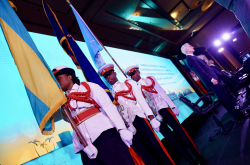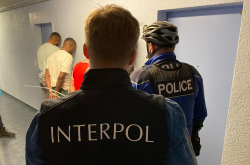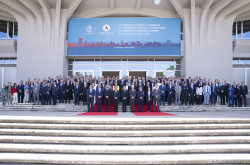LYON, France – The world police body has launched the INTERPOL Financial Crime and Anti-Corruption Centre (IFCACC) to provide a coordinated global response against the exponential growth in transnational financial crime.
Fueled by ever-increasing globalization and digitalization, criminals are able to commit financial crime with increasing efficiency and sophistication, undermining global financial systems, impeding economic growth and causing huge losses to businesses and individuals worldwide.
A 2020 survey by consulting firm PwC of businesses in 99 territories showed that nearly half of all respondents had reportedly fallen victim to financial crime in the previous two years, with losses totaling USD 42 billion. In terms of volume, fraud is now the most prevalent form of criminality in some countries.
Corruption likewise adds to the complexity of the crime landscape, creating a fertile ground for organized criminal activities. The two crime types are inextricably linked, with both often relying on similar mechanisms to move and launder illicit funds, increasingly involving transnational organized crime groups.
According to a recent INTERPOL assessment, member countries reported that financial crime and corruption were among the top three threats they currently face.
Centralizing the international response
“The COVID-19 pandemic has demonstrated the speed with which criminal groups can modify their methods to take advantage of new opportunities for defrauding individuals and companies, with millions of dollars stolen every day,” said INTERPOL Secretary General Jürgen Stock.
“INTERPOL’s new crime centre will expand and streamline the world police body’s existing initiatives in tackling financial crimes, illicit money flows and asset recovery by centralizing the international response to transnational financial crime and corruption,” added Secretary General Stock.
Adopting a multi-agency approach, IFCACC will work closely with key stakeholders to strengthen collective efforts against financial crime and corruption.
These include the Financial Action Task Force (FATF), the FATF-Style Regional Bodies (FSRBs), the Egmont Group of Financial Intelligence Units, law enforcement agencies, police organizations and the financial sector.
Action on the ground
By providing investigative, operational and analytical support, as well as capacity building, IFCACC will target fraud and payment crime, money laundering and asset recovery, and corruption.
The new centre will coordinate the Organization’s HAECHI operations, which target cyber-enabled financial crime. The previous two HAECHI operations brought together law enforcement in 20 countries, resulting in thousands of arrests and intercepting more than USD 100 million in illicit funds.
Operation HAECHI-II saw INTERPOL officials pilot test a new global stop-payment mechanism, known as the Anti-Money Laundering Rapid Response Protocol (ARRP). This enables more member countries to submit and handle requests to follow, intercept or provisionally freeze illegal proceeds of crime. It is estimated that less than 1 per cent of criminal funds flowing through the international financial system are currently intercepted by law enforcement.
The centre will also coordinate operations and capacity building activities targeting telecom fraud and other types of social engineering scams, money laundering and corruption in sport. IFCACC will also lend its expertise to other INTERPOL projects covering crime areas with a corruption or financial crime component, such as human trafficking or environmental crime.
As the illegitimate use of virtual assets, particularly cryptocurrencies, has matured significantly in recent years and is now a widespread method to facilitate crime, IFCACC will also lead the Organization’s efforts providing operational support against money laundering associated with virtual assets.
“Whether it’s corruption or financial crime, the criminal business model remains the same: bad actors, motivated by money and operating on a global level,” said Rory Corcoran, Acting Director of IFCACC.
“Now, with this dedicated centre, we will be able to help police follow that money better than ever before, intercepting illicit funds before they disappear and arresting perpetrators, whether they’re hiding behind a screen or a public office.”
Read more about INTERPOL’s Financial Crime and Anti-Corruption Centre
Read more about INTERPOL’s anti-corruption and asset recovery work








